|
|
|
Sort Order |
|
|
|
Items / Page
|
|
|
|
|
|
|
| Srl | Item |
| 1 |
ID:
165317
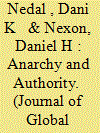

|
|
|
|
|
| Summary/Abstract |
Do international systems tend to remain anarchic because of recurring balances of power, or do they tend toward imbalances and hierarchy? Leading structural theories posit competing predictions about systemic outcomes, and the historical record offers evidence to support both claims. This suggests the need to theorize conditions under which one tendency or another is likely to dominate and what factors lead systems to transition from one state to another. We draw on constructivist and English School insights about international authority and legitimacy to develop such a framework. We conceive of patterns of international authority as structures independent from, and interacting with, mechanisms usually associated with international anarchy, such as the balance of power. We propose that international authority systems vary along two dimensions: particularist cosmopolitan and substitutable nonsubstitutable. Both are emergent properties of ideas and institutions located at the unit level. We argue that certain authority systems—particularist and nonsubstitutable—reinforce, and are reinforced by, anarchy and balanced distributions of capabilities. Others—cosmopolitan substitutable—facilitate rollup and domination and are likely to emerge or be maintained in hierarchic and highly asymmetric systems. By offering a structural account of international authority, we hope to contribute to the global turn in international relations, offering a framework for comparing systems across time and space. We also aim to help make sense of contemporary struggles over norms and values, their structural causes and consequences, and their potential implications for the future of global power politics.
|
|
|
|
|
|
|
|
|
|
|
|
|
|
|
|
| 2 |
ID:
160511
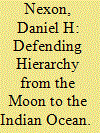

|
|
|
|
|
| Summary/Abstract |
Why do leading actors invest in costly projects that they expect will not yield appreciable military or economic benefits? We identify a causal process in which concerns about legitimacy produce attempts to secure dominance in arenas of high symbolic value by investing wealth and labor into unproductive (in direct military and economic terms) goods and performances. We provide evidence for our claims through a comparative study of the American Project Apollo and the Ming Dynasty's treasure fleets. We locate our argument within a broader constructivist and practice-theoretic understanding of hierarchy and hegemony. We build on claims that world politics is a sphere of complex social stratification by viewing constituent hierarchies in terms of social fields. Our specific theory and broader framework, we contend, provide tools for understanding the workings of power politics beyond military and economic competition.
|
|
|
|
|
|
|
|
|
|
|
|
|
|
|
|
| 3 |
ID:
150527
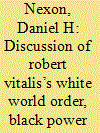

|
|
|
|
|
| Summary/Abstract |
In White World Order, Black Power Politics: The Birth of American International Relations, Robert Vitalis presents a critical disciplinary history of the field of international relations, and the discipline of political science more broadly. Vitalis argues that the interconnections between imperialism and racism were “constitutive” of international relations scholarship in the U.S. since the turn of the 20th century, and that the perspectives of a generation of African-American scholars that included W. E. B. Dubois, Alain Locke, and Ralph Bunche were equally constitutive of this scholarship—by virtue of the way the emerging discipline sought to marginalize these scholars. In developing this argument, Vitalis raises questions about the construction of knowledge and the racial foundations of American political development. These issues lie at the heart of U.S. political science, and so we have invited a range of political scientists to comment on the book and its implications for our discipline.
|
|
|
|
|
|
|
|
|
|
|
|
|
|
|
|
| 4 |
ID:
145147
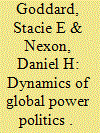

|
|
|
|
|
| Summary/Abstract |
We call for a research program focused on the dynamics of global power politics. Rather than link realpolitik to structural-realist theoretical frameworks or the putatively anarchical character of world politics, the program treats power politics as an object of analysis in its own right. It embraces debate over the nature of global power politics among scholars working with distinctive approaches. It sees the structural contexts of power politics as highly variable and often hierarchical in character. It attenuates ex ante commitments to the centrality of states in global politics. And it takes for granted that actors deploy multiple resources and modalities of power in their pursuit of influence. What binds this diverse research program together is its focus on realpolitik as the politics of collective mobilization in the context of the struggle for influence among political communities, broadly understood. Thus, the study of the dynamics of collective mobilization—the causal and constitutive pathways linking efforts at mobilization with enhanced power—brings together approaches to security studies in a shared study of power politics.
|
|
|
|
|
|
|
|
|
|
|
|
|
|
|
|
| 5 |
ID:
126321
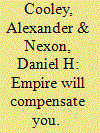

|
|
|
|
|
| Publication |
2013.
|
| Summary/Abstract |
Many commentators refer to the U.S. overseas network of military installations as an "empire," yet very few have examined the theoretical and practical significance of such an analogy. This article explores the similarities and differences between the basing network and imperial systems. We argue that American basing practices and relations combine elements of liberal multilateralism with "neo-imperial" hegemony. Much, but far from all, of the network shares with ideal-typical empires a hub-and-spoke system of unequal relations among the United States and its base-host country "peripheries." But Washington rarely exercises rule over host-country leaders and their constituents. Historical examples suggest that this combination of imperial and non-imperial elements has rendered the United States vulnerable to political cross-pressures, intermediary exits, and periodic bargaining failures when dealing with overseas base hosts. Moreover, globalizing processes, especially increasing information flows and the transnational networking of anti-base movements, further erode U.S. capacity to maintain multivocal legitimation strategies and keep the terms of its individual basing bargains isolated from one another. Case studies of the rapid contestation of the terms of the U.S. basing presence in post-Soviet Central Asia and post-2003 Iraq illustrate some of these dynamics.
|
|
|
|
|
|
|
|
|
|
|
|
|
|
|
|
| 6 |
ID:
061234
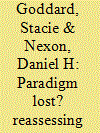

|
|
|
| 7 |
ID:
092335
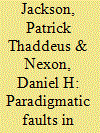

|
|
|
|
|
| Publication |
2009.
|
| Summary/Abstract |
American scholars routinely characterize the study of international relations as divided between various Kuhnian "paradigms" or Lakatosian "research programmes." Although most international relations scholars have abandoned Kuhn's account of scientific continuity and change, many utilize Lakatosian criteria to assess the "progressive" or "degenerative" character of various theories and approaches in the field. We argue that neither specific areas of inquiry (such as the "democratic peace") nor broader approaches to world politics (such as realism, liberalism, and constructivism) deserve the label of "paradigms" or "research programmes." As an alternative, we propose mapping the field through Weberian techniques of ideal-typification.
|
|
|
|
|
|
|
|
|
|
|
|
|
|
|
|
| 8 |
ID:
186768
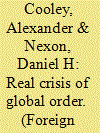

|
|
|
| 9 |
ID:
167203
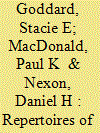

|
|
|
|
|
| Summary/Abstract |
Issues involving ‘statecraft’ lie at the heart of most major debates about world politics, yet scholars do not go far enough in analyzing how the processes of statecraft themselves can reshape the international system. We draw on the growing relational-processual literature in international relations theory to explore how different modes of statecraft can help create and refashion the structure of world politics. In particular, we argue that scholars should reconceive statecraft in terms of repertoires. An emphasis on repertoires sheds light on a number of issues, including how statecraft influences patterns of technological innovation, the construction of institutional and normative orders, and the pathways through which states mobilize power in world politics.
|
|
|
|
|
|
|
|
|
|
|
|
|
|
|
|
| 10 |
ID:
124430
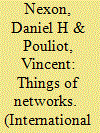

|
|
|
|
|
| Publication |
2013.
|
| Summary/Abstract |
We come to this forum not to advocate for actor-network theory (ANT) but to raise friendly questions about its role in International Relations (IR). As outsiders to ANT, we recognize that these issues may be addressed within that broader literature. But since we are proponents of the use of frameworks that share with ANT a commitment to the analytical priority of processes, relations, and practices, we also have a particular interest in its development within our field
|
|
|
|
|
|
|
|
|
|
|
|
|
|
|
|
| 11 |
ID:
084673
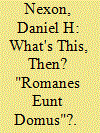

|
|
|
|
|
| Publication |
2008.
|
| Summary/Abstract |
This article cautions against a number of errors endemic to recent attempts to derive "lessons of empire" for United States foreign policy and grand strategy: (1) justifying the comparison between the United States and past imperial polities based on shared characteristics unrelated to the analytic category of empire, (2) failing to offer recommendations specific to imperial dynamics, (3) assuming that "empire" serves as an "analytic box" composed of otherwise indistinguishable entities, and (4) assessing the question of American Empire in categorical, rather than relational, terms. I next offer an ideal-typical account of the structure and dynamics of empires and discuss how such attention to patterns of domination and resistance-which I term the "micropolitics of hierarchy"-might provide better analytic leverage over key contemporary challenges than the traditional states-under-anarchy framework.
|
|
|
|
|
|
|
|
|
|
|
|
|
|
|
|
|
|
|
|
|